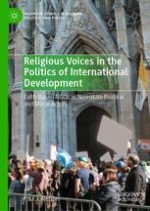This first study of faith-based development NGOs’ (FBOs) political roles focuses on how U.S. FBOs in international development educate and mobilize their constituencies. Most pursue cautious reformist agendas, but FBOs have sometimes played important roles in social movements. Nelson unpacks those political roles by examining the prominence of advocacy in the organizations, the issues they address and avoid, their transnational relationships, and their relationships with religious and secular social movements. The agencies that educate and mobilize U.S. constituencies most actively are associated with small Christian sects or with non-Christian minority faiths with historic commitments to activism or service. Specialized advocacy NGOs play important roles, and emerging movements on immigration and climate may represent fresh political energy. The book examines faith-based responses to the crises of climate change, COVID-19, and racial injustice, and argues that these will shape the future of religion as a moral and political force in America, and of NGOs in international development.
